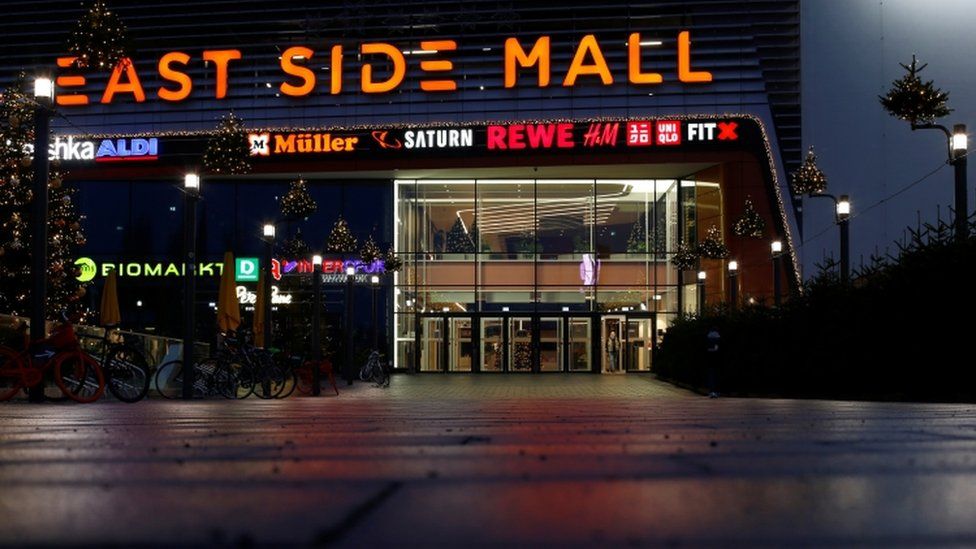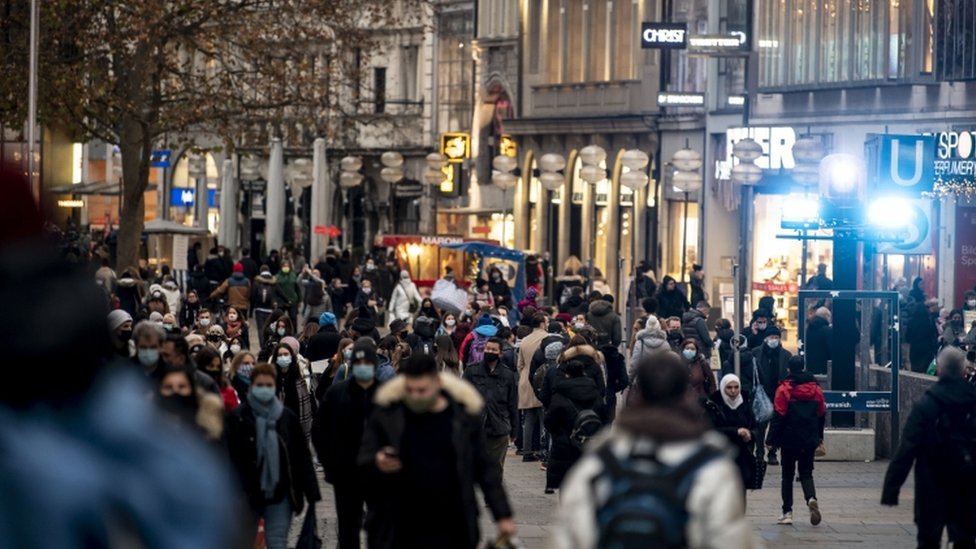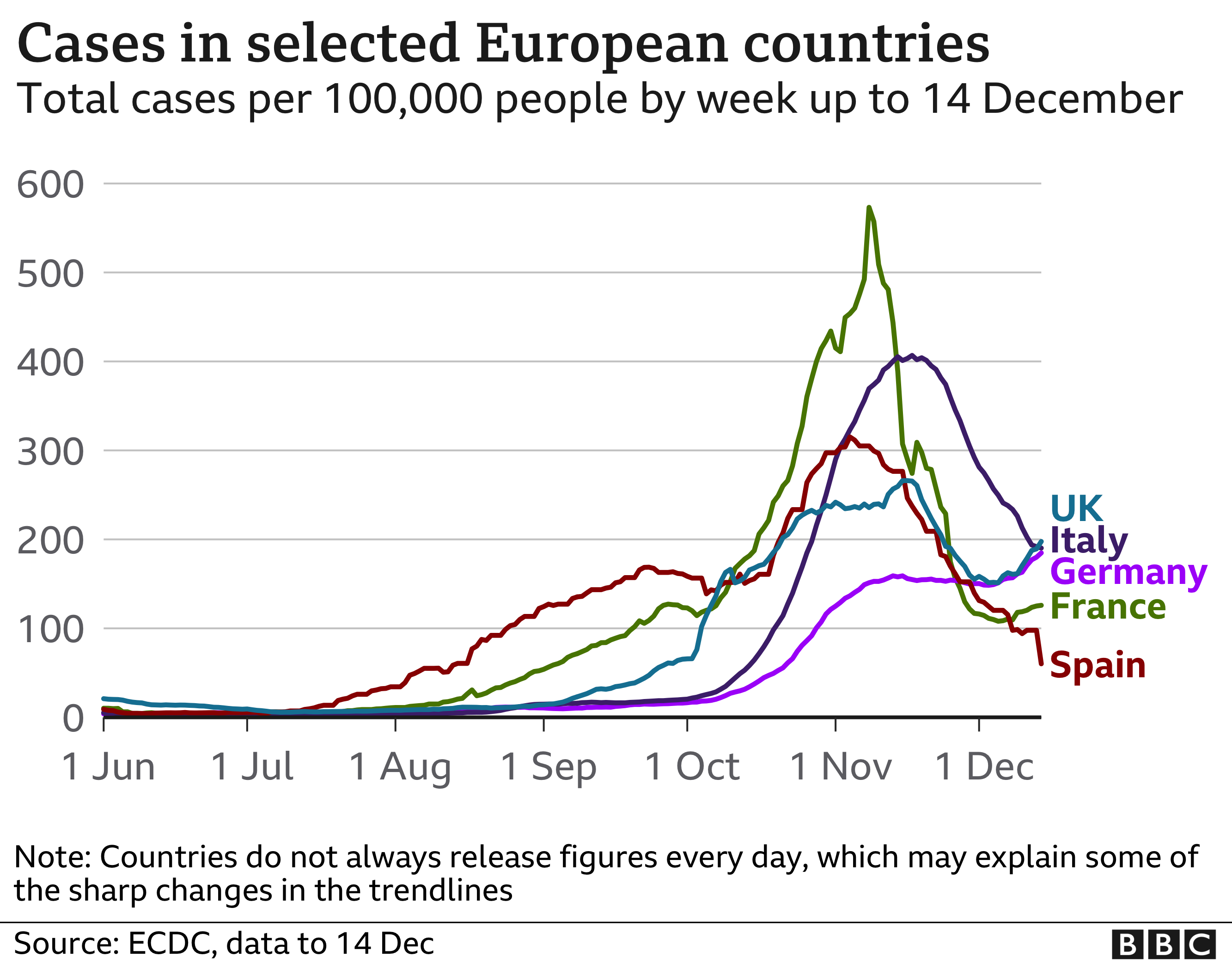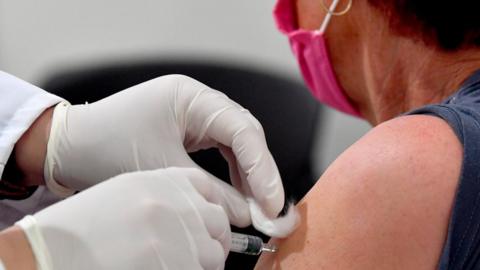Covid-19: Germany introduces new restrictions amid rise in cases

Germany has entered a hard lockdown, closing schools and non-essential businesses in an attempt to stop a sharp rise in Covid-19 infections.
The measures will be in place until 10 January. Christmas will see a slight easing, with one household allowed to host up to four close family members.
The country reported another 952 deaths and 27,728 cases on Wednesday.
Meanwhile EU chief Ursula von der Leyen said the first Covid vaccine would be authorised for use within a week.
Ms von der Leyen told the European Parliament the Pfizer/BioNTech vaccine – developed in Germany – would be rolled out for the bloc the same day, more than a week earlier than originally envisaged.
The news came after the German government said it was pressuring the European Medicines Agency (EMA) to speed up approval of the vaccine. It has already been approved by regulators in the UK and the US.
The EMA is due to discuss the rollout next Monday.
Other European countries have joined Germany in tightening restrictions ahead of Christmas, and France has introduced a night-time curfew.
What are Germany’s new measures, and why now?
Only essential businesses such as supermarkets and banks will be allowed to remain open. Restaurants, bars and leisure centres have been shut since November and some areas of the country had imposed their own lockdowns.
Hair salons are among the businesses which must close, while drinking alcohol in public places, such as popular mulled wine stalls, is forbidden. Companies are being urged to allow employees to work from home.
The 952 new fatalities announced on Wednesday are a new peak for Germany’s pandemic, but may cover numbers that were not included in previous days.
 IMAGE COPYRIGHTEPA
IMAGE COPYRIGHTEPALothar Wieler, head of Germany’s Robert Koch Institute, which is overseeing the Covid-19 response, said the situation was “more serious than it has ever been”.
“The number of cases is higher than ever and they keep rising. There is the danger that the situation will keep getting worse and it will get harder and harder to deal with the pandemic and its consequences,” he said.
Deutsche Welle reported that while cases in the younger population were falling, they were still rising among older people who were more likely to suffer more serious problems from the virus. Numbers in intensive care are said to have reached alarming levels.
Announcing the new measures over the weekend, Chancellor Angela Merkel said that the “lockdown light” begun in November had not done enough to bring the virus under control.
The figures are particularly shocking, as during the early months of the pandemic Germany was more successful than many other European countries in its handling of the crisis.
What’s gone wrong for the country that came so successfully through the first wave of the pandemic?
Some blame Germany’s regional leaders who, until now, have dithered, bickered and resisted Chancellor Merkel’s calls for a tougher nationwide response.
And Prof Iris Pigeot, director of the Leibniz Institute for Prevention Research and Epidemiology, says that “people do not follow all the regulations that they’re told. We had to reduce our contacts by about 75% but I think that didn’t work”.
She’s concerned. “New Year’s Eve and Christmas could be a complete nightmare with increasing numbers, increasing numbers of deaths.”
What’s the situation elsewhere in Europe?
France has replaced its second national lockdown with a curfew from 20:00 to 06:00. People will not be allowed out of the house without an authorisation form.
Christmas Eve will be exempt, but the rule will stay in place for New Year’s Eve. Bars and restaurants are to remain closed until at least 20 January.
The number of people in France who have died from coronavirus infections rose by 790 on Tuesday to a total of 59,072.
People in France are no longer required to print or download an official justification for leaving their homes during the day.


The Netherlands is currently under a five-week lockdown, the strictest set of measures announced in the country since the pandemic began.
Non-essential shops, cinemas, hairdressers and gyms closed on Tuesday, and schools have now followed suit. People have also been told to refrain from booking non-essential travel abroad until mid-March.
But restrictions will be eased slightly for three days over Christmas, when Dutch households are allowed three guests instead of two.
In the UK, London entered England’s highest tier of lockdown rules on Wednesday. Pubs and restaurants must close, except for takeaway and delivery, and indoor entertainment venues such as theatres, bowling alleys and cinemas must remain shut.
Meanwhile, Italy’s daily death toll is still close to 500 and the government is considering a further tightening of measures over Christmas.
The exact details are unclear, but a new lockdown could come into place between Christmas night and New Year. Prime Minister Giuseppe Conte described the potential lockdown as a “new squeeze”.
Lithuania has gone into lockdown, with a ban on non-essential movement between towns. Contact between separate households is also banned.
Austria is to set out its plans for Christmas, including an extension of the rules on mask-wearing indoors and limits on meetings between households.
And Denmark is extending its “partial lockdown” across the whole country. From Wednesday venues including restaurants and sports centres will be closed in areas until now unaffected by the restrictions.





